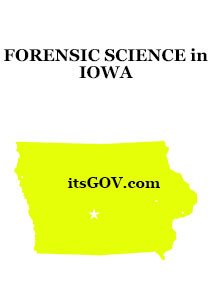Forensic Science
Forensic science combines science and investigation in order to aid and support the prosecution or defense in criminal and civil investigations. While the profession has been widely romanticized by various TV shows, make no mistake – this job is most likely different that you expect. In contrast with popular perception, this is a highly scientific role, which often involves detailed, painstaking work. Field duties are limited to a few areas of expertise, and most often than not a forensic scientist will spend his time in the lab.
If you made it this far, though, congratulations! You’re taking the first steps in joining a very rewarding profession and itsGOV is here to guide you through what you need to know and what you need to do to join a forensic science program in North Carolina.
If criminals knew there were 440 forensic lab technicians working across North Carolina they may think twice before breaking the law. These experts do everything from examining digital evidence to performing chemical analysis of drugs or conducting firearm ballistic tests; all while working in a controlled lab environment. The requirements for becoming a forensic scientist in North Carolina vary from city to city, with some general overlapping education requirements.
Using capabilities available through technological advances, forensic scientists were able to recently link the fingerprints found at the scene of a 1981 murder in Raleigh to a suspect who was determined to have probable cause. Although in some ways the advances in technology came too late as the primary suspect died over a decade ago, forensic scientists were able to bring a sense of closure to the friends and family of the victim. And as criminals learn about the abilities of modern technology they may also reconsider breaking the law.
Forensic Science Training in North Carolina
Forensic scientists commonly work with the following agencies throughout North Carolina:
- Winston-Salem Police Department’s Forensic Services Division
- Durham Police Department’s Forensic Services Unit
- Charlotte-Mecklenburg Police Department’s Crime Lab
- Fayetteville Police Department
- Cary Police Department
- High Point Police Department
- Wilmington Police Department
- State Crime Lab in Raleigh, with two other branches:
- Western Regional Crime Lab in Asheville
- Triad Regional Crime Lab in Greensboro
In general, an associate’s degree allows students to prepare to pursue a bachelor’s or master’s degree in forensic science through a scientific curriculum and plenty of hands-on experience in analyzing and processing the physical evidence found at crime scenes. A comprehensive associate’s degree program will incorporate physical science and law in the context of forensic investigations.A bachelor’s degree in forensic science not only provides an education in the technical aspects of forensic science, but in the biological sciences, physics, and chemistry, as well. As such, a bachelor’s degree in forensic science is rather cross-disciplinary, with students engaging in both criminal justice and science courses. Through a comprehensive bachelor’s degree program in forensic science, students are provided with an appreciation of the scientific and social environment of crime and of the criminal justice system.
Forensic Science Requirements in North Carolina
The number of forensic science professionals is growing in North Carolina. In North Carolina, 20 more forensic science professionals were working in 2010, than there were in 2006. This represents a 5% growth in the field. This growth is faster than the national trend for forensic science professionals which shows a 1% increase in the number of forensic science professionals working around the nation.
Forensic Science Salary in North Carolina
In North Carolina, as the number of forensic science professionals is growing, the salaries earned by forensic science professionals are increasing. The mean salary for forensic science professionals in 2006 was $36,050 per year. And in 2010 the mean salary was $43,900 per year.
Forensic science jobs in North Carolina can be found with agencies across the state. Because of the breadth of the field, there are a variety of fields in which forensic scientists can specialize, and the education for these specializations varies accordingly. What is common for all forensic scientist positions at the state level is a bachelor’s degree, and other forensics jobs require either a higher level degree or additional certification. Compared to some other states in the nation, North Carolina has a robust community of forensic science professionals who are working in the field today. According to 2012 data from the U.S. Bureau of Labor Statistics, 440 forensic science technicians are working in different areas and in different capacities throughout the state. The average salary of those who are working in North Carolina is $45,480 annually. Over the past several years, the number of forensic professionals in the state has been rising and dropping in waves. The greatest dip was in 2008, when there were 520 professionals in the field, to 2009, when the number dropped to 380. Today, things seem to be going better, and there seem to be more people employed. In fact, employment for forensic science technicians in North Carolina is expected to grow by 24 percent, faster than average, from 2010 to 2020, according to data from Career One Stop, sponsored by the U.S. Department of Labor. This growth is stronger than the nationwide projected growth, which is forecast at 19 percent for 2010 to 2020. Most of the people working in forensic science are working in crime labs and with law enforcement agencies throughout the state. The majority of the jobs seem to be in the areas with the higher populations.
Forensic Science Schools and Colleges in North Carolina
Bachelor’s Degree Programs in North Carolina
| University | Fayetteville University, Forensic Science B.S. |
| Duration | 24 months |
| Type | Full time, Part time |
| Tuition and fees | $23,283 per year |
| Program link |
| University | Methodist University, Forensic Science B.S. |
| Duration | 24 months |
| Type | Full time, Part time |
| Tuition and fees | $29,080 per year |
| Program link |
| University | Methodist University, Applied Forensic Science B.S. |
| Duration | 24 months |
| Type | Full time, Part time |
| Tuition and fees | $29,080 per year |
| Program link |
| University | St. Andrews University, Forensic Science B.S. |
| Duration | 24 months |
| Type | Full time, Part time |
| Tuition and fees | $23,540 per year |
| Program link |
| University | Western Carolina University, Forensic Anthropology B.S. |
| Duration | 24 months |
| Type | Full time, Part time |
| Tuition and fees | $23,540 per year |
| Program link |
| University | Western Carolina University, Forensic Science B.S. |
| Duration | 24 months |
| Type | Full time, Part time |
| Tuition and fees | $23,540 per year |
| Program link |
Master’s Degree Programs in North Carolina
There are no Forensic Masters Programs in North Carolina.




